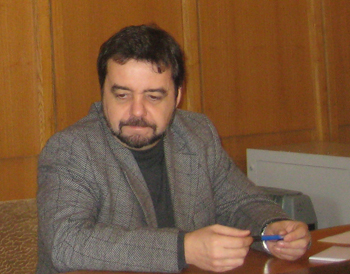
Mikhail Tyaglyy
April 8 marked International Roma Day, which aims to bring attention to the marginalization and racism affecting the Roma minority in Europe. USC Shoah Foundation educational consultant and historian Mikhail Tyaglyy believes testimony is one important way of fighting against the bigotry and intolerance that still affect people decades after the Holocaust.
Tyaglyy spent two years as an interviewer for the Shoah Foundation in the 1990s, conducting around 100 testimonies of Jewish Holocaust survivors, Krimchaks and rescuers in Crimea.
After his time with the Shoah Foundation came to an end, Tyaglyy, a graduate of Taurida National University, said he decided to focus his research on the “understudied” history of the Holocaust in the Soviet Union, including, recently, the Ukrainian Roma community during World War II. Tyaglyy has consulted and/or authored a number of USC Shoah Foundation's educational materials, including Where Do Human Rights Begin: Lessons of History and Contemporary Approaches, Pain of Memory and Encountering Memory.
“The main goal of my work in this field is through acquainting those who are interested with historical facts and tragic events in the European history to demonstrate the dangers of xenophobia and intolerance and alert them to the historical conditions under which society may become prone to mass violence, ethnic cleansing, and genocide,” Tyaglyy said.
Tyaglyy said the Roma people have been subject to stereotypes and prejudice for the last five centuries. Because they have been pushed to the margins of society for so long, Roma today have lost the ability to find ways to integrate and succeed in society, he said.
“In order to accomplish this integration, they need the support to demonstrate the benefits of entering into the wide world, and the society needs to be persuaded to accept the Roma and not to resist this process,” Tyaglyy said. “The Roma need interest and support, new symbols and practices, which will help them become aware of their importance and modernize their identity. This, in my opinion, is the main significance of the International Day of the Roma.”
While some psychologists argue that xenophobia and prejudice are inherent to human nature, Tyaglyy said that’s not an excuse to not try to eradicate it. Simply studying facts and tragic statistics will not change how people think; rather, educators must find ways to appeal to students’ values, ability to empathize and sense of personal choice and responsibility.
“The attempts to deny or prohibit prejudice are simply futile,” Tyaglyy said. “The only way to debunk it is to show the reasons of its formation and the specific conditions under which it occurs. This, in turn, will make one probe its relativity.”
He has observed how effective video testimony is in conveying the significance of historical events to students, as opposed to textbooks or the “admonitions of elders.” However, simply showing testimony isn’t enough, he said – the context in which it is taught in the classroom is equally important for presenting the Holocaust and human rights so that students understand it.
Tyaglyy said educational materials produced by the USC Shoah Foundation do exactly that.
“In the activities and lesson plans developed by my colleagues, experienced educators and methodology specialists, these testimonies have truly begun to work effectively and bring across to the audience the experience of those who lived through the hatred and violence, intolerance and bigotry―the experience that cannot be denied, nor can it be ignored,” Tyaglyy said. “It cannot leave anyone indifferent, and therefore that educational work was not done in vain.”